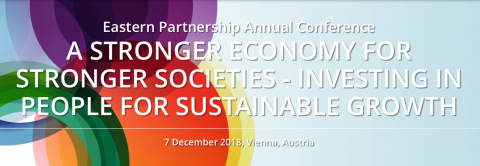
On 7 December in Vienna, the Austrian Presidency of the European Council is hosting the first high-level annual Eastern Partnership (EaP) conference around the subject of ‘A stronger economy for stronger societies - Investing in people for sustainable growth’.
Following up on the Eastern Partnership Summit last November, it is now time to take stock of the achievements within the 20 Deliverables for 2020 which best demonstrate tangible results reached in 2018.
The 2018 monitoring of the 20 Deliverables for 2020 indicates that specific attention has been paid to supporting Small and Medium-sized Enterprises, creating and sustaining job opportunities in Partner Countries, and to fostering skills development in line with market demands. Moreover, the EU launched a substantial Youth & Education Package in 2018 with the aim to create the necessary conditions for youth to study, work, participate fully in society and fulfil their potential for the future of the region.
The conference will therefore bring together stakeholders from the EaP in order to highlight success stories of 2018 in the partner countries (Armenia, Azerbaijan, Belarus, Georgia, Moldova and Ukraine) and to discuss some key areas for the future: the economic and investment climate, labour market challenges and youth issues (education, training and employment).
The conference will be opened by Dr Karin Kneissl, Austrian Federal Minister for Europe, Integration and Foreign Affairs and Johannes Hahn, the EU Commissioner for Neighbourhood and Enlargement Negotiations.
This will be followed by three panel discussions through the day:
- Panel I: Improving the business environment in an inclusive manner: which actors and which measures can best contribute to stronger societies?
The objective of this session is to identify key economic and legal conditions to improve the business and investment climate in Partner Countries, and which factors (e.g. inclusion, participation, cohesion) contribute to stronger societies (and foster job creation), while giving concrete examples of successful policies. - Panel II: Matching market needs and skills: how do we ensure that people are equipped with the right qualifications?
The objective of this session is to discuss what qualifications the economies in Partner Countries need for job-creation and how to ensure that such qualifications are provided to the people, including on the basis of concrete examples. - Panel III: Investing in our future: how to foster youth employment and employability?
The objective of this session is to identify ways and give concrete examples of best practice to ensure an easier transition from education to work, as well as how to foster youth entrepreneurship.
Date
7/12/18, 10:00-17:30
